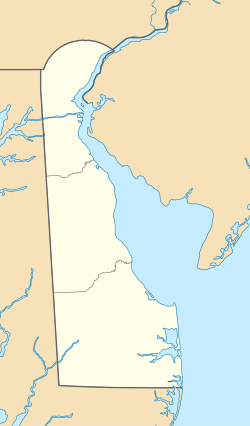Barratt's Chapel
|
Barratt's Chapel
|
|

Barratt's Chapel in 1982
|
|
| Nearest city | Frederica, Delaware |
|---|---|
| Coordinates | 39°1′28.6″N 75°27′34.36″W / 39.024611°N 75.4595444°WCoordinates: 39°1′28.6″N 75°27′34.36″W / 39.024611°N 75.4595444°W |
| Built | 1780 |
| NRHP Reference # | 72000281 |
| Added to NRHP | October 10, 1972 |
Barratt's Chapel is a chapel located to the north of Frederica in Kent County, Delaware. It was built in 1780 on land donated by Philip Barratt, owner of Barratt Hall, and a prominent local landowner and political figure. Barratt, who had recently become a Methodist, wanted to build a center for the growing Methodist movement in Delaware.
Barratt's Chapel is the oldest surviving church building in the United States built by and for Methodists, but it earns its title as the "Cradle of Methodism" because of what happened there in 1784.
Methodism began in England as a movement within the Church of England led by John and Charles Wesley. As members of the Methodist Societies emigrated to the American colonies, Methodism took root in the New World.
Between 1768 and 1774, John Wesley sent Francis Asbury and seven other Methodist lay preachers to the colonies to minister to the growing societies. When the American Revolutionary War broke out, only Asbury and James Dempster chose to remain in America. Dempster withdrew to a farm in the Mohawk Valley of upstate New York, where he remained for the rest of his life, preaching occasionally in the surrounding area. Asbury became the effective leader of American Methodists.
In 1784, with peace returned, John Wesley sent his friend Thomas Coke to America with instructions to find Asbury and to discuss with him the future of American Methodism. Coke came to Barratt's Chapel on Sunday, November 14, 1784, expecting to find Asbury. As Wesley's personal emissary, Coke was invited to preach. During the sermon Asbury arrived. Coke came down from the pulpit and embraced him. A star in the floor of the Chapel commemorates this historic meeting. During this service the sacraments of baptism and Holy Communion were administered for the first time by ordained Methodist clergy.
...
Wikipedia


